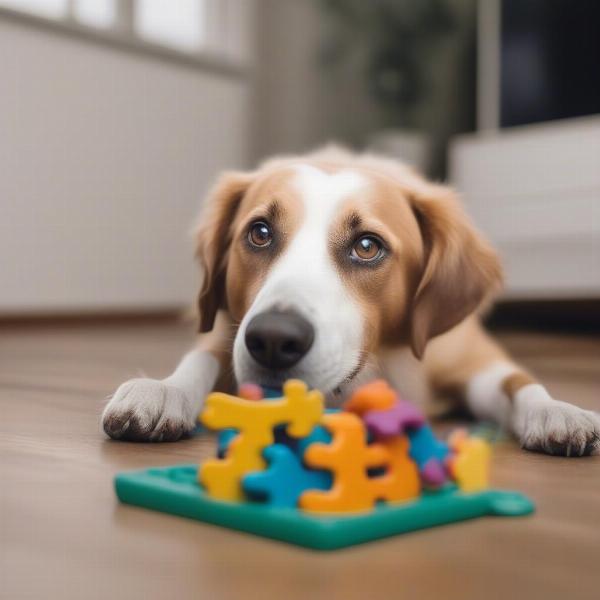Responsible dog ownership encompasses much more than providing food and shelter. It’s a commitment to ensuring your dog’s physical and emotional well-being, as well as contributing to a safe and harmonious community. This involves understanding your dog’s needs, providing proper care, and being a considerate neighbor. Whether you’re a seasoned dog owner or just starting out, this guide will equip you with the knowledge and resources to be the best possible guardian for your furry friend.
Understanding Your Dog’s Needs: The Foundation of Responsible Ownership
Every dog, regardless of breed or age, has fundamental needs that must be met for a happy and healthy life. These include proper nutrition, regular exercise, mental stimulation, and a safe, comfortable environment. Failing to address these needs can lead to behavioral issues, health problems, and a diminished quality of life for your canine companion.
Providing Proper Nutrition: Fueling a Healthy Life
A balanced diet is crucial for your dog’s overall health. Choosing a high-quality dog food appropriate for their age, breed, and activity level is essential. Consult with your veterinarian to determine the best dietary plan for your dog’s specific needs.
The Importance of Regular Exercise: Beyond Daily Walks
Exercise is not just about physical activity; it’s also a vital outlet for your dog’s mental and emotional energy. Regular walks, playtime, and engaging activities help prevent boredom, reduce stress, and promote good behavior.
Mental Enrichment: Keeping Your Dog Sharp and Engaged
Just like humans, dogs need mental stimulation to thrive. Puzzle toys, training sessions, and interactive games can challenge their minds and keep them entertained.
 Dog with Puzzle Toy
Dog with Puzzle Toy
Being a Responsible Member of the Community
Responsible dog ownership extends beyond the home. It means being considerate of your neighbors and taking steps to ensure your dog doesn’t pose a nuisance or safety risk.
Leash Laws and Public Spaces: Respecting Shared Environments
Always adhere to leash laws in public areas. This not only protects your dog but also prevents unwanted interactions with other dogs or people.
Picking Up After Your Dog: A Simple Act of Courtesy
Cleaning up after your dog is a fundamental responsibility. Dog waste can transmit diseases and pollute the environment. Always carry dog waste bags and dispose of them properly. pick up your dog poop signs explain the importance of keeping public areas clean.
Preventing Barking Nuisances: Maintaining Peaceful Coexistence
Excessive barking can be disruptive to neighbors. Addressing the underlying causes of barking, such as boredom or anxiety, is crucial for maintaining a peaceful community. don’t leave dog waste offers further guidance on maintaining community hygiene.
Investing in Training and Socialization
Training and socialization are essential for responsible dog ownership. A well-trained dog is a joy to be around and is less likely to exhibit problem behaviors. dog warden nottingham provides resources for local regulations and support.
Basic Obedience: The Foundation for a Strong Bond
Teaching your dog basic commands, such as sit, stay, and come, creates a foundation for communication and control.
Socialization: Building Confidence and Adaptability
Exposing your dog to various people, places, and situations from a young age helps them develop into well-adjusted adults. dog bags poop provides practical solutions for responsible waste management.
Conclusion: Embracing the Joys and Responsibilities of Dog Ownership
Responsible dog ownership is a rewarding journey that requires commitment, patience, and a deep understanding of your canine companion’s needs. By prioritizing their physical and emotional well-being and being a responsible member of the community, you can ensure a happy, healthy life for your dog and foster a positive relationship with your furry friend. Remember, dog poo bin offers information on proper waste disposal facilities.
FAQ
- How often should I feed my dog? Feeding schedules vary depending on age, breed, and activity level. Consult with your veterinarian for personalized recommendations.
- How much exercise does my dog need? Most dogs benefit from at least 30 minutes of exercise per day, but some breeds require more.
- What are some signs of a healthy dog? A healthy dog typically has bright eyes, a shiny coat, a healthy appetite, and regular bowel movements.
- How can I prevent my dog from barking excessively? Addressing underlying causes like boredom or anxiety, along with training, can help reduce barking.
- How do I choose the right dog food? Consider your dog’s age, breed, activity level, and any specific dietary needs when selecting dog food. Consult your veterinarian for guidance.
- How often should I groom my dog? Grooming frequency depends on breed and coat type. Regular brushing and occasional baths are essential for most dogs.
- How can I find a reputable dog trainer? Seek recommendations from your veterinarian, local shelters, or other dog owners.
ILM Dog is a leading international online resource dedicated to providing dog owners with expert advice on all aspects of canine care, from breed selection and health to training and nutrition. We offer a wealth of information to empower you to be the best possible guardian for your four-legged friend. Whether you’re a seasoned dog owner or just starting your journey, ILM Dog is here to support you. Contact us at [email protected] or +44 20-3965-8624 for personalized guidance.